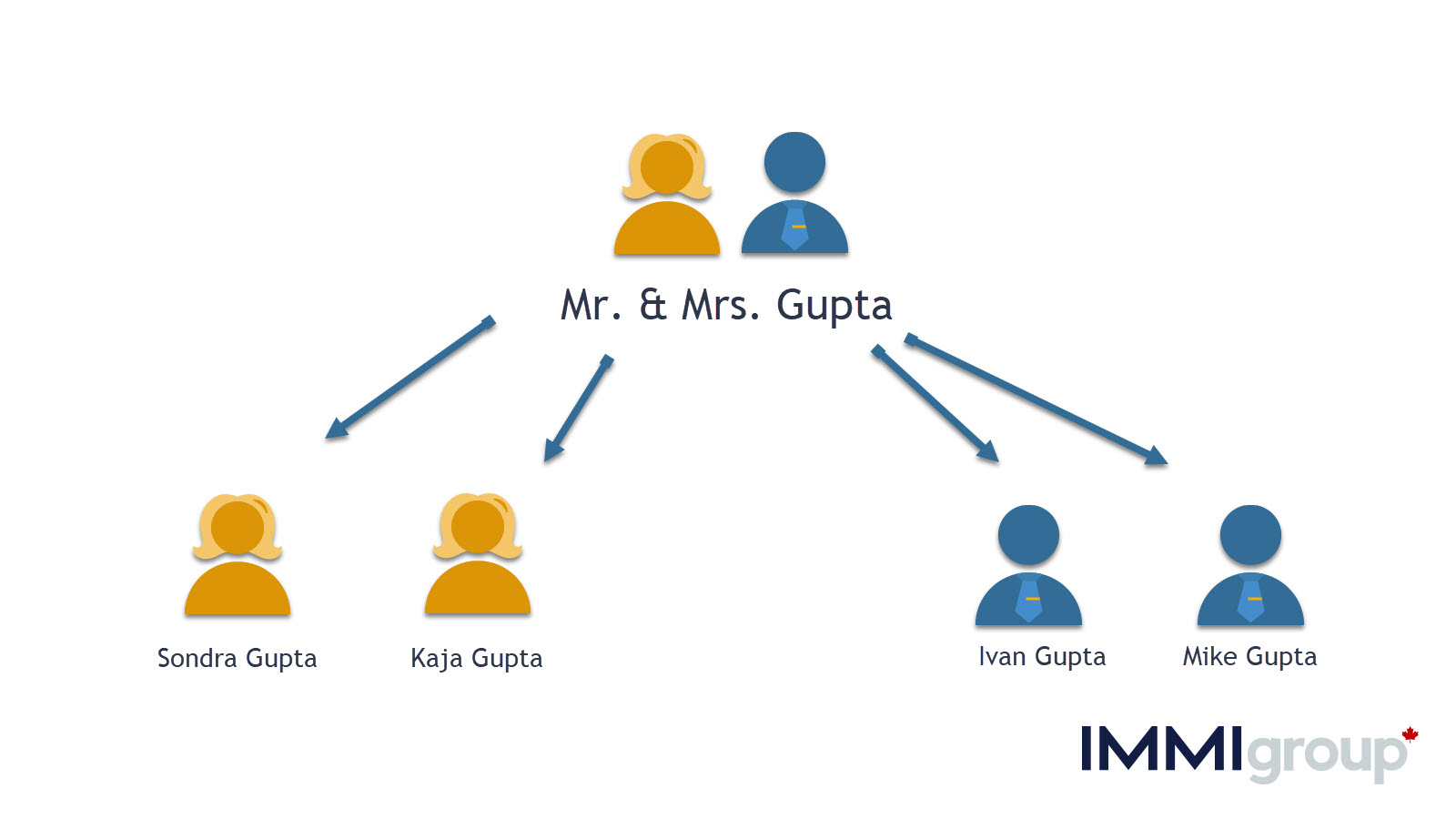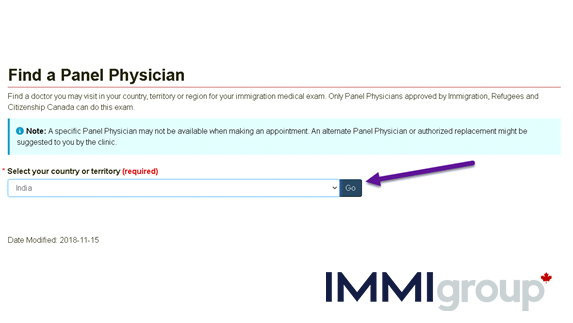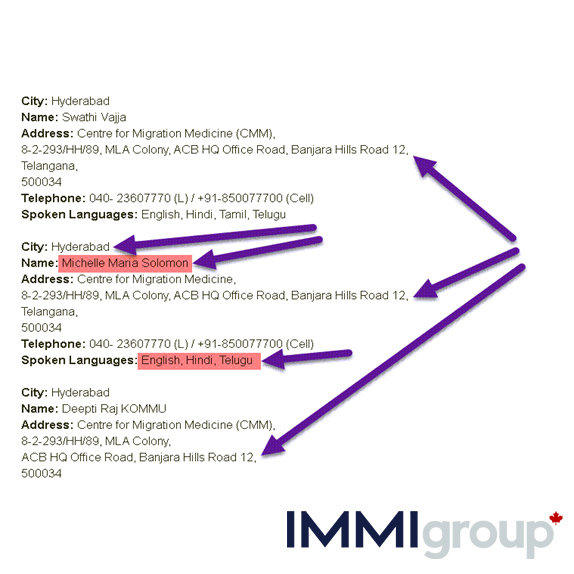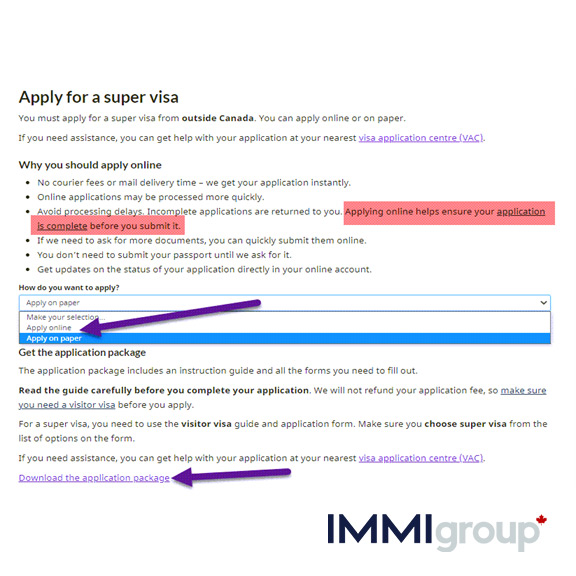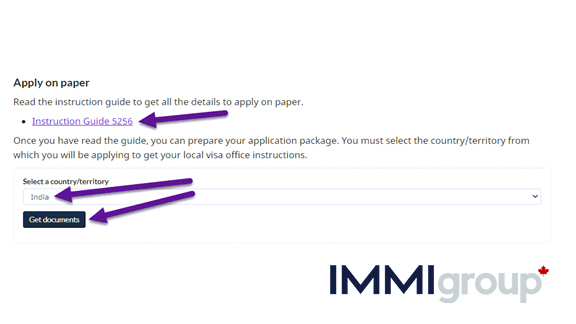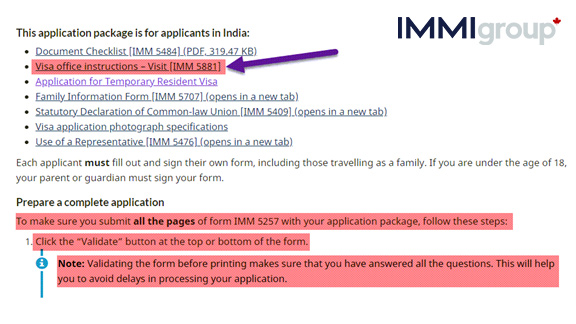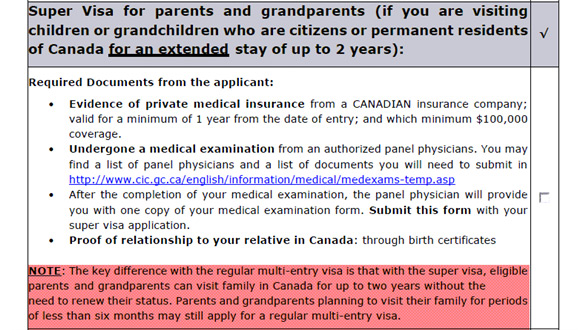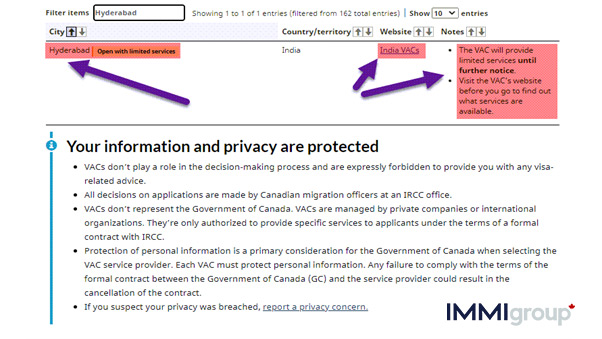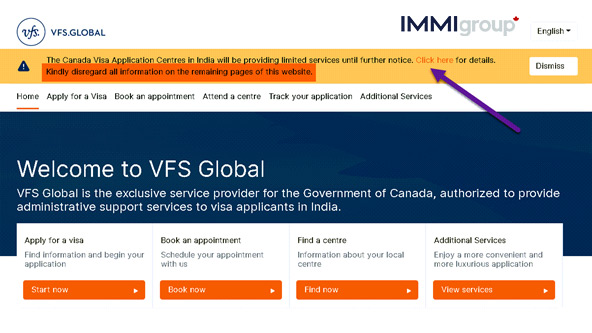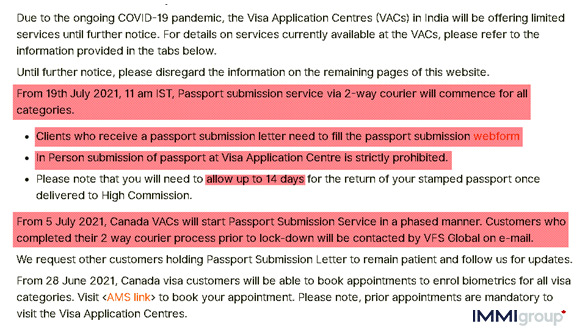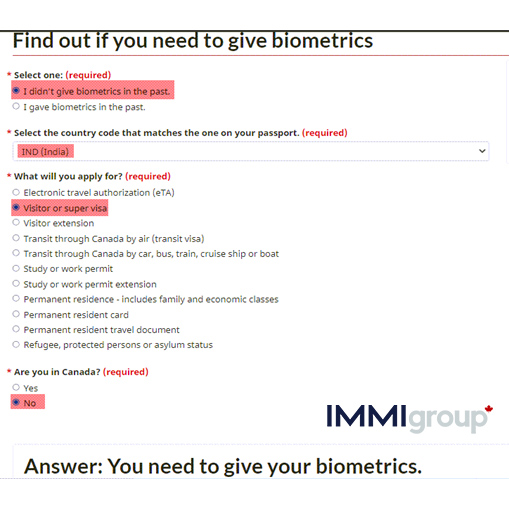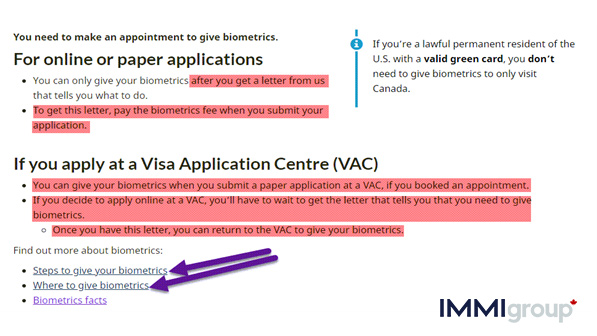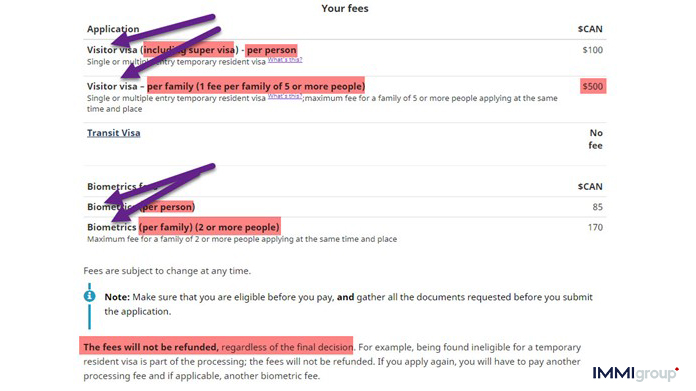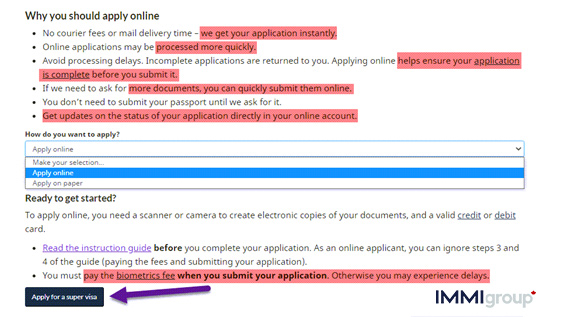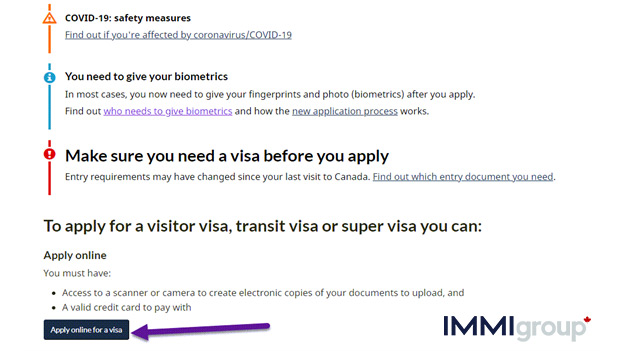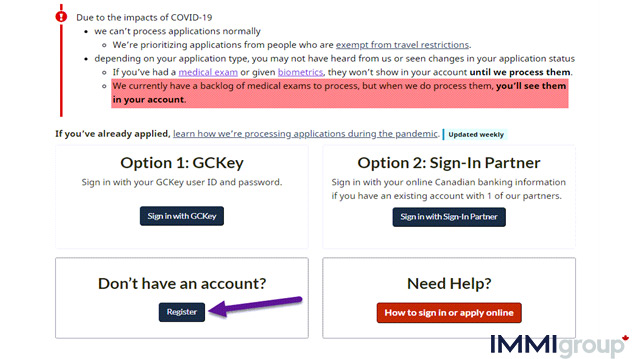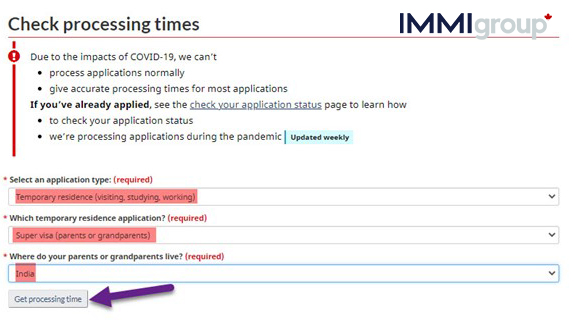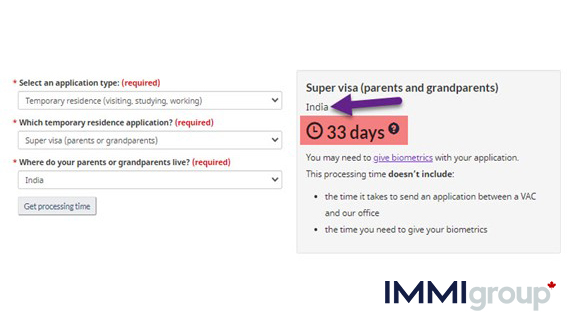Super Visa Course

For anyone who has children or grandchildren living overseas in Canada and who visit them on a regular basis, applying for a visitor visa every time you travel to Canada to see them can become a wearying experience after a few years. Wouldn’t it be so much easier if there was one visa that was valid for up to 10 years?
There is. Super Visa for parents and grandparents.
So, what exactly does this Super Visa do?
- With a Super Visa you can have multiple entries to Canada over a period of up to 10 years.
- You can visit (that is make a single visit) for up to 2 years.
- That means applying once every 10, or perhaps 5 or 6, years. For a frequent visitor to Canada that’s a relief.
- It’s essentially an open-ended visitor visa but limited to parents and grandparents of children or grandchildren living in Canada on a permanent basis.
CHAPTER 1 – ELIGIBILITY
Can anyone apply for a Super Visa?
- No, it is only for parents or grandparents of citizens or permanent residents of Canada.
- That means NO other dependents of the parents or grandparents can use that super visa.
Imagine this family tree for a fictional family with roots in India and substantial ties to Canada:
The Guptas (Mr. & Mrs.) live in Hyderabad while their four children live as follows:
- Sondra has lived in Canada for 3 years and has permanent resident status.
- Mike has lived in Canada for 7 years and is a citizen and is married and has 2 young kids.
- Ivan is finishing his engineering studies at Waterloo University in Canada and is therefore a temporary resident on a study permit.
- Kaja lives with her parents in Hyderabad, India and is starting her post-secondary studies in India.
Let’s assume the Guptas wish to visit their children (and grandkids) in Canada on a fairly regular basis. Here’s how the process works.
Who is the principal applicant for a super visa?
The Guptas – that is Mr. & Mrs. Gupta; the parents – clearly are. However, they can’t just apply out of the blue. They will need a number of supporting documents which will hopefully prove their eligibility for a Super Visa. So, let’s start with a look at what the eligibility requirements are.
What are all the eligibility requirements for a Super Visa?
- ONE: You must have a child or grandchild (be the parent or grandparent of them) who is either a Canadian citizen or a permanent resident of Canada.
Looking at the Gupta’s family tree that means that it’s only Sondra and Mike who enable Mr. & Mrs. Gupta to be eligible to apply for a Super Visa. Ivan is a temporary resident on a study permit, so he doesn’t qualify as a citizen or permanent resident of Canada.
- TWO: You must have a signed Letter of Invitation from the child or grandchild that is inviting you to come stay with them in Canada. The signed letter must include:
- A promise to support you (the parents or grandparents) financially while you stay in Canada.
- A list of the people (as well as the number of people) who live in the household of the child or grandchild inviting you to Canada. Please note that this number will be used to calculate the amount of income the child/grandchild will need to have to support their parent/grandparent when they visit them in Canada.
- A copy of the child or grandchild’s citizenship or permanent resident document.
Again, in the case of the Gupta’s, this means that only Sondra OR Mike can sign the letter of invitation and not only that, only one of them must be the ones who Mr. & Mrs. Gupta will be staying with when they visit Canada. Ivan cannot invite them, and they can’t stay with Ivan during their visit although they can visit him while maintaining either Sondra’s or Mike’s home as their base camp, so to speak.
So, summing up how to put together a Letter of Invitation, the Sponsor has to write the letter according to the requirements below and send it to the parent or grandparent coming to visit you on a Super Visa. You may be requested to notarize the letter in some cases.
The Letter of Invitation should include the following information on the person you are inviting to visit you in Canada (in this case, your parents or grandparents):
- complete name,
- date of birth,
- address and telephone number,
- your relationship to the person,
- the purpose of the trip,
- how long the person plans to stay in Canada,
- where the person will stay, and how he or she will pay for things, and
- when the person plans to leave Canada.
As well, it should include the following information about the person inviting the parent/grandparent to visit them in Canada (in this case, the person sponsoring their parents/grandparents):
- complete name,
- date of birth,
- address and telephone number in Canada,
- job title,
- whether you are a Canadian citizen or permanent resident,
- a photocopy of a document proving your status in Canada, such as
- a Canadian birth certificate, if you were born in Canada,
- a Canadian citizenship card, if you are a naturalized citizen, or
- a copy of your PR card or your IMM 1000 proof of landing, if you are a permanent resident,
- details of your family, such as names and dates of birth of your spouse and dependants. Please note that this information is mandatory for the parent and grandparent Super Visa.
- the total number of people living in your household, including people you sponsored whose sponsorship is still in effect. Please note that this information is mandatory for the parent and grandparent Super Visa.
Finally, the following additional information is required because it is a Letter of Invitation for a Parent/Grandparent coming to Canada on a Super Visa:
- a written and signed promise of your financial support for your parents or grandparents for their entire stay in Canada, and
- proof that your income meets or is above the low-income cut-off or LICO for the total number of people, including the visiting parents or grandparents. See Chapter 1 to find out how to calculate what a Sponsor’s necessary income is.
- Please note that with a Super Visa the Child or Grandchild is not officially considered a Sponsor, but does have to comply with some requirements similar to those of a Sponsor like showing that you have sufficient income.
- THREE: You must also have medical insurance from a Canadian insurance company that:
- Is valid for at least 1 year from the date of your planned entry into Canada,
- Has a minimum coverage of CAD$ 100,000
- Have proof that you have paid the insurance. DO NOT just send quotes. You must have an official receipt of payment or a similar invoice/document.
- FOUR: You must take a Medical Exam before coming to Canada. You can take your medical exam right before submitting your application package – this is called an upfront medical exam – or you can wait to receive instructions after you apply. Remember that if you take your medical exam upfront and there are delays in processing your Super Visa application, your medical exam’s validity will be from the date of the exam. If you wait to receive instructions the medical exam will be more recent when it comes time to travel to Canada.
Let’s take a moment to look at how to get a medical exam for a super visa.
CHAPTER 2: MEDICAL EXAMS
You will need to provide a document proving you underwent a valid immigration medical exam with what is called a panel physician. Here’s how to do that:
- First you have to find the nearest panel physician. A panel physician is a doctor authorized by Canadian immigration authorities to do exams on people who wish to visit or immigrate to Canada. Go here to find a panel physician. This is what you’ll see:
We’ve chosen India as that’s where Mr. & Mrs. Gupta will take their medical exam. Click Go to see a list of panel physicians. In this case, here’s what the Gupta’s will see next:
There are 7 panel physicians listed for Hyderabad, the city our fictional family the Gupta’s live in, so we’ve chosen Michelle Maria Soloman. Note however, that she works at the Centre for Migration Medicine which has several doctors listed as panel physicians. As you can also see, a variety of languages are spoken at the clinic, making it a convenient destination to take a medical exam. The Gupta’s could also have chosen any other panel physician, as long as they are listed at this webpage. If the doctor you take your medical exam with is not a panel physician, your medical exam will NOT be accepted and you will have to take another exam with a panel physician, resulting in delays.
Once you’ve found a panel physician and reserved a time for your exam, you should follow these instructions and make sure you bring:
- Government ID with a photograph
- Eyeglasses or contact lenses if you use them
- Previous medical reports/studies if you have a medical condition
- A list of current medications
- If your panel physician doesn’t use eMedical, bring 4 recent photographs – go here for the requirements for your photographs.
- Bring any proof you have of COVID vaccinations you have had. As well, during the exam your panel physician may offer you a COVID vaccine which you can take if you wish (it is voluntary in other words).
- You must pay for any and all costs associated with your medical exam
- In our example, we’ll assume you are going to take this exam before submitting your application for a Super Visa. This is called an Upfront Medical Exam, so we’re assuming that you won’t have been given a form IMM 1017E. You will have to complete a form – see right below for more details
As this will be an upfront Medical Exam, the doctor must give you a copy of form IMM 1017B Upfront Medical Report after your exam is finished. You must include form IMM 1017B either attached to your paper application or uploaded digitally if you apply online.
Remember however, you may choose to take your medical exam after you have applied and then receive instructions from IRCC. In this case you will be sent a form IMM 1017E Medical Report.
Your medical exam will be valid for 1 year (12 months) only, from the date you took the exam. Remember to make sure your medical exam is valid when you apply for a super visa, and make sure you use a panel physician. As super visa applicants tend to be more mature people, the medical exam is a vital part of your application package.
Let’s continue with eligibility requirements for Super Visa applicants.
CHAPTER 3: MORE ELIGIBILITY REQUIREMENTS
- FIVE: You must be admissible to Canada (as is the case for a regular visitor visa or for any other document allowing you to visit, travel through, or move to Canada).
The best way to define admissibility is to look at typical reasons why you might be deemed inadmissible to Canada:
- Security reasons like espionage, subversion, violence, or terrorism,
- Human rights or International rights violations like war crimes or crimes against humanity,
- Having committed a crime, including driving under the influence of drugs or alcohol (DUI),
- Organized crime, like smuggling, narcotics, or money-laundering,
- Medical reasons that endanger public health and safety or that would put too much of a strain on health and social safety nets in Canada,
- Financial reasons like not being able to support oneself (although in this case it is the child or grandchild in Canada who has to prove they have the financial resources to support their visiting parents/grandparents),
- Misrepresentation which means lying to Canadian authorities about anything they might ask you,
- Having an inadmissible family member.
If you are deemed inadmissible to Canada, you may still be able to visit Canada by applying for a Temporary Resident Permit. However, this is not the same as a Super Visa. In order to be successful in applying for a Temporary Resident Permit you have to convince Canadian immigration authorities that your need to visit your children or grandchildren in Canada outweighs any health or safety risks to the pubic in Canada. In other words, applying for a temporary resident permit is never guaranteed to be successful.
SIX: Another key eligibility requirement is that the children or grandchildren who the grandparents or parents want to visit will have to show they have sufficient funds to support their grandparents/parents for the duration of their visit. Let’s go through the steps the child/grandchild must take to prove their financial ability to support you in your visits to Canada:
- First, the child or grandchild in Canada must calculate the total number of people in their household. This should include:
- Themselves, plus
- Their spouse/common-law partner if they have one, plus
- Any dependent children if they have any, plus,
- Any previously sponsored person for whom the sponsorship is still in effect, plus
- You – the parent/grandparent – and any spouse/partner you may have
- Then they should go to the Income Table and look up the necessary level of income based on the total number of people calculated in the first step. So far in 2021, IRCC has been using the 2020 Low-income cut-off table shown below:
| Low-income Cut-Off LICO | |
| Size of Family Unit | Minimum Necessary Gross Income in CAD$ |
| 1 | $ 25,921 |
| 2 | $ 32,270 |
| 3 | $ 39,672 |
| 4 | $ 48,167 |
| 5 | $ 54,630 |
| 6 | $ 61,613 |
| 7 | $ 68,598 |
| Over 7, for each additional person add: | $ 6,985 |
- Once the child/grandchild in Canada has calculated the necessary income and assured themselves that they comply, they must send copies of one of the following documents (or similar documents) to their parent/grandparents abroad to include with their Super Visa application:
- Notice of Assessment (NOA) from most recent tax year, OR
- T1/T4s of the most recent tax year in Canada, OR
- Employment Insurance stubs, OR
- Pay stubs, OR
- Bank statements, OR
- An Employment Letter with salary and date they were hired.
Remember, the only applicants for a Super Visa allowed are the parent or grandparent of the Canadian citizen or permanent resident. An applicant for a Super Visa cannot be any other relative. This means that:
- Other dependents of the grandparents/parents CANNOT be included in the application for a Super Visa. They will have to apply for a regular visitor visa if they wish to visit Canada.
- In our example, that means that Kaja Gupta who is living in Hyderabad with her parents cannot be included in their Super Visa application and would have to apply independently for a visitor visa to visit her brothers and sisters in Canada.
CHAPTER 4: IMPLICIT ELIGIBLITY REQUIREMENTS
However, we’re not quite done yet with eligibility requirements. IRCC also has what we might call implicit requirements that they consider, and which might make it harder for you to apply for a Super Visa seeing these factors could make immigration officials doubt that you will return to your home country when your visit to Canada is over.
There isn’t a straightforward list that officials tick off in these cases. It’s more the case that these factors can sometimes lower the probability of success. It doesn’t mean you shouldn’t apply. It does mean that you might have to be a little more cautious and be aware that perhaps you could be asked for further documentation, slowing down the process.
- Do you have business in your home country?
- Are you economically secure in your home country?
- Do you own your own home in your home country?
- Are you motivated by reasons other than seeing your children/grandchildren? Perhaps business or job opportunities?
- Are you associated with any political movements that might raise eyebrows in Canada?
- Is your home country economically stable?
- Is it politically stable?
In other words, these are some of the questions immigration officials look at when deciding whether you will indeed return to your home country after visiting your children or grandchildren in Canada. As we point out in our visitor visa tutorial, a Summary Letter or Letter of Explanation is often useful to clear up any doubts an immigration officer might have.
Please go to Chapter 2a or our Visitor Visa Course: Summary Letter and Letters of Invitation (Letter of Explanation)
CHAPTER 5 – HOW TO APPLY ON PAPER
You can apply on paper or online for a Super Visa. You can also always ask for assistance at a Visa Application Centre (VAC) nearest you. Let’s go through the steps on how to apply.
Your first choice is whether to apply on paper or online. As many of you might be more comfortable applying on paper, we’ll go through both methods, starting with a paper application as many of you may be more comfortable with this method.
Applying On Paper
Go here and scroll down until you see the following:
As you can see in the high-lighted section, IRCC reminds you that applying online is quicker because any missing information can be requested by email by immigration officials. This makes it less likely your application will be returned as incomplete and delay the whole process. Keep this in mind when you’re deciding how to apply.
Let’s continue with our paper-based application. Choose Apply on paper from the drop-down menu and then click on the last link to download the application package.
Clicking on the Download the application package link will take you here where you should scroll down until you see:
Click on the link to see the Instruction Guide (IMM 5256). Next, we’ll choose India from the drop-down menu and then click on Get Documents. This takes us here:
Right-click each link and choose Save link as … then save to your computer’s hard drive. Go to your Windows Explorer and open the file from there. You will have to fill in these forms (on your computer) and then print and sign and date them. You can always go to your nearest VAC for assistance if you have difficulty doing this on your own.
Please note that you will get specific Visa Office instructions depending on where you apply from. Let’s look at Visa office instructions for India:
Essentially, the instructions for India mirror the general requirements we went through in Chapter I ELIGIBILITY at the start of our tutorial. The main supporting documents you need to provide are:
- The Letter of Invitation
- Proof of financial support by your child/grandchild
- Medical exam results
Now let’s go through the forms you have to fill out.
The good news is we’ve covered all the documents you have to fill out in our Visitor Visa tutorial. We take you through each of the forms you have to fill out:
- IMM 5257 Visitor Visa application form
- IMM 5645 (or 5707) Family Information form
- IMM 5484 Document Checklist
- IMM 5409 Statutory Declaration of Common-law union (if applicable)
- IMM 5476 Use of a Representative (if applicable)
- IMM 5475 Authority to Release Personal Information to a Designated Individual
So, go here to our Visitor Visa tutorial to see how to fill out each of the above forms.
CHAPTER 6: VISA APPLICATION CENTRES (VACs)
A Visa Application Centre is a private company contracted by Canadian immigration authorities to provide the following services:
- Send your visa application and passport to the visa office in a safe and secure way,
- Provide Biometrics Collection points where you go to give biometrics which most applicants for visas to Canada must give,
- Provide services in the local language used in the countries/regions where they are located.
In other words, a Visa Application Centre is where you submit your application package and where you previously can go to get help and to give biometrics.
So, remember, to get assistance in filling out the forms, you can go to your nearest Visa Application Centre (VAC). You should note that COVID restrictions may still be in place at some VACs.
Go here to find the nearest VAC to you and scroll down to the bottom of the page. This, for example, is what you’ll see if looking for a VAC in Hyderabad, India:
As you can see, we wrote Hyderabad in the search box to find the nearest VAC to the Gupta’s which gave us the VAC in Hyderabad. Notice that currently it is providing limited services. Notice also that there is a link to the website of the private firm India VACs. You should check your local VAC’s website to see what services they are currently offering before going there or making an appointment.
- Remember, you can contact a VAC by phone; by email; or in person.
Clicking on that link takes us to the Visa Application Centre’s website:
PLEASE NOTE: VFS, a major VAC provider, tells you right at the top of their website to click on the red Click here link and ignore the rest of their website for the time being as they are only providing limited services at VACs in India given COVID disruptions. Clicking on the red Click here link takes us here:
Please remember that in normal circumstances you will be able to visit your nearest VAC and obtain assistance in filling out your forms. The above image shows temporary COVID restrictions which are being slowly lifted. The main point is to go to your local VACs website after you do the search and make sure what services are being provided.
CHAPTER 7: PAY YOUR APPLICATION FEES & BIOMETRICS
The first thing you need to do is see whether you need to give biometrics. Nowadays, visitors from most countries, including India, have to give biometrics. To make sure go here and you’ll see the following:
As you can see, we’ve entered information consistent with our fictional family, the Guptas from Hyderabad. We’re assuming they haven’t given biometrics in the past and that they have passports consistent with their Indian citizenship. We’ve chosen the Visitor or super visa option and we’ve answered No to the question of whether they are applying for a super visa from within Canada.
As you can clearly see, Mr. & Mrs. Gupta will have to give biometrics. Scrolling down the same page you’ll see the instructions for giving biometrics include the option of giving biometrics at a Visa Application Centre (VAC). Remember however, to check and see if the VAC you will be using is offering full or limited services.
As you can see processing fees can be calculated per person or by family unit of 5 or more people.
The same holds true for biometrics in which case the family unit is 2 or more people.
CHAPTER 8: APPLYING ONLINE
Let’s now turn to online applications. Let’s go back to the first drop-down menu that asks you How do you want to apply?
Now we choose online rather than on paper:
As you can see, IRCC has a list of the benefits of applying online in bullet form:
- Your application is received instantly and (usually) processed more quickly.
- Any incomplete forms or missing documents are flagged when you apply so you can correct any mistakes before submitting the online application package.
- Requests for additional documents are received by you quickly and, once you upload the documents electronically, sent quickly.
- By logging into your online account (which you will have to create to be able to apply online and communicate with IRCC officers) you can follow your application’s progress.
Additionally, they suggest paying the biometrics fee at the same time as you pay your processing fees when you apply in order to avoid delays.
Finally, the blue Apply for a super visa button near the bottom of the page is where you click to begin the process. Here’s what you see next:
Because of COVID restrictions, they send to this page to provide you links to information about some of the measures currently in place. Scroll down to the blue button, again, and click there. You’ll then be taken here:
Here’s where you start the process to register for an online account with IRCC. If you’ve looked through our Visitor Visa Tutorial this page should look familiar because we cover the process there. So, click here to see how to continue with your online application.
Please go to Chapter 8 or our Visitor Visa Course: How to Apply Online-for-your-Visitor-Visa
CHAPTER 9: AFTER YOU APPLY – PROCESSING TIMES, OUTCOMES, & ARRIVECAN APP
Processing Times
IRCC currently states that times are normally a “few weeks or less”. Unfortunately, processing times do vary by country, so it also depends on where you’re applying from. To get an official estimate of processing times go to the Check processing times webpage and select from the three drop-down menus:
In keeping with our fictional Gupta family, we’ve chosen the following for each drop-down menu:
- Temporary resident (visiting, studying, working)
- Super visa (parents or grandparents)
- India
Next click on the light grey Get processing time button. This is what you’ll see next if you enter as we did above:
So, this is closer to 5 weeks. Remember however, that India is experiencing delays because of COVID restrictions, and many VACs are currently operating at partial capacity. Let’s look at some other processing times. There are basically two groups of countries: those with processing times; and those without processing times.
COUNTRIES WITH PROCESSING TIMES
| Country | Processing time Super Visa |
| Bulgaria | 232 days |
| Colombia | 232 days |
| China | 232 days |
| Egypt | 232 days |
| France | 232 days |
| Ghana | 232 days |
| Hong Kong | 232 days |
| Israel | 232 days |
| India | 33 days |
| Jamaica | 232 days |
| Lebanon | 232 days |
| Nigeria | 232 days |
| Pakistan | 570 days |
| Singapore | 232 days |
| South Korea | 232 days |
| Taiwan | 232 days |
| UAE | 232 days |
| UK | 232 days |
| Vietnam | 232 days |
COUNTRIES WITH NO PROCESSING TIME AVAILABLE
| Country | Processing time Super Visa |
| Austria | No processing time available |
| Brazil | No processing time available |
| Croatia | No processing time available |
| Chile | No processing time available |
| Cuba | No processing time available |
| Estonia | No processing time available |
| Greece | No processing time available |
| Indonesia | No processing time available |
| Kosovo | No processing time available |
| Mexico | No processing time available |
| Qatar | No processing time available |
| Sweden | No processing time available |
| Turkey | No processing time available |
The rest of the listed countries either show No processing time available or 232 days. Except for two countries in South Asia: India for which we have 33 days; and Pakistan which has a disheartening time of 570 days. This can mean a few things:
- Super Visa applications are not coming in in a great enough number to give a good average in the case of most countries.
- This seems to be supported by the fact that many of the countries that show No processing time available are first-world countries in Europe like The Netherlands or Germany where perhaps there is little interest in Super Visas. The UK might be an exception because some immigrants to the UK sometimes choose after living for a while in the UK to then move on to Canada, Australia or the U.S.
- However most Asian first-world nations like Japan, Singapore or South Korea show processing times of 232 days.
- India just might be the intended target of this policy with a much lower processing time than any other country, and citizens from other countries are being subtley discouraged from applying for Super Visas. Of course, it may be that most Super Visa applications are coming from India and IRCC has put a clear procedure in place to quickly process them.
- Please keep in mind, however, that as COVID restrictions are lifted, the data on average processing times for Super Visas will improve as more parents and grandparents apply for them.
Did you need help with a Visitor Visa? Check out Immigroup’s Free Course
Outcomes: Approved, Rejected, Returned, or Additional Documents
Approved
If your application is successful, your passport(s) will be returned with a Super Visa stamped inside them. Your original documents will also be returned (except for bank statements).
Rejected
If your application is rejected, your passport and other original documents (but not your bank statements or any documents suspected to be fake) will be returned to you with a letter explaining why your application was rejected.
Returned
If your application is incomplete – missing documents or forms that are not completely filled out – your application will be returned to you without processing.
Additional Documents/Information
IRCC may also request additional information before deciding on your application. This might include:
- An interview with immigration officials in your country
- Additional information – documents etc.
- Medical exam
- Police certificate
ArriveCAN
As we explain in our blog, ArriveCAN is an app you must use to upload information for your flight to Canada. If you do not upload information to ArriveCAN within 72 hours of boarding your flight, you could be denied permission to board the flight. While ArriveCAN was developed to monitor the health status of passengers (COVID tests, vaccinations, and quarantine plan), it is unclear if and when its use will be discontinued.
